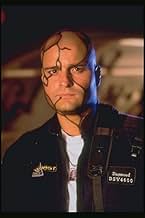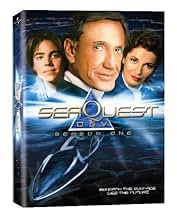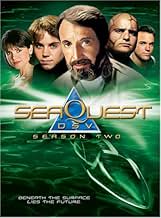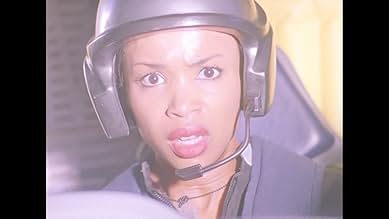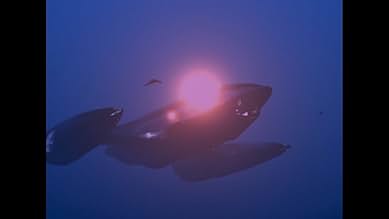Au début du 21e siècle, l'humanité a colonisé les océans. L'Organisation des Océans Unis fait appel au Capitaine Nathan Bridger et au sous-marin seaQuest DSV pour maintenir la paix et explor... Tout lireAu début du 21e siècle, l'humanité a colonisé les océans. L'Organisation des Océans Unis fait appel au Capitaine Nathan Bridger et au sous-marin seaQuest DSV pour maintenir la paix et explorer la dernière frontière sur la Terre.Au début du 21e siècle, l'humanité a colonisé les océans. L'Organisation des Océans Unis fait appel au Capitaine Nathan Bridger et au sous-marin seaQuest DSV pour maintenir la paix et explorer la dernière frontière sur la Terre.
- Récompensé par 2 Primetime Emmys
- 3 victoires et 5 nominations au total
Parcourir les épisodes
Avis à la une
Seaquest DSV was a show that could have stood above all the mediocre offerings out in TV Land today. At a time when Television Sci Fi is being bombarded with Aliens, Eco Terrorists, Mythical beasties Seaquest was an attempt to give the world an accurate depiction of what our future 'could' have been. Now I am a HUGE Sci Fi nut and will always love the genre, but I was thrilled when I saw the first episode come on TV in 1993. Here was a future mankind could actually look forward to. No Spaceships zipping across galaxies in half an hour, No ray guns that would vaporize an enemy. Here was Science, without the fiction. Deep sea colonization, deep sea mining, exploring underwater volcano's, All of this was within the realm of what Man could achieve. Seaquest presented an atmosphere where ALL nationalities came together with a goal of bettering ourselves, not just snatch and grab. Alas, it was not meant to be. The evil Ratings gods looked at the 1st season's ratings and said.."Let's make it more Science FICTION" And the fans died off one by one. They, like me, stayed faithfully with the show thru it's second season. But by season 3 the interest was gone and what could have been a Shining example of the Future, became just another entry in the book of "What might wave been"
It's always the same thing. No matter how good or bad a show is, the ratings alone decide it's faith. With good ratings a show is renewed every season and nobody will make changes to it's format. With bad ratings a show is canceled after (or during) it's first season.
But what if the ratings are not good enough to have the show renewed for another season, but not bad enough to have the show canceled either. Then they always make a second season that is so different from the first one that the few fans it had will stop watching and no new viewers will tune in. Will they ever learn it's better to cancel a show than to dramatically change it? Changing it will only make you lose the audience it has. It will not bring in new viewers! And that is what happened to SeaQuest DSV. It was a great show in the beginning. But the changes they made to the format didn't just scare the few fans it had away, it even scared it's lead (Roy Scheider) away!
But what if the ratings are not good enough to have the show renewed for another season, but not bad enough to have the show canceled either. Then they always make a second season that is so different from the first one that the few fans it had will stop watching and no new viewers will tune in. Will they ever learn it's better to cancel a show than to dramatically change it? Changing it will only make you lose the audience it has. It will not bring in new viewers! And that is what happened to SeaQuest DSV. It was a great show in the beginning. But the changes they made to the format didn't just scare the few fans it had away, it even scared it's lead (Roy Scheider) away!
I was 12 when SeaQuest premiered on a Sunday night in 1993. I was so excited because Steven Spielberg was one of the producers, Roy Scheider (Jaws!!) was the captain and Jonathan Brandis was so cool thanks to Ladybugs and the Neverending Story 2.
I absolutely loved the first season. Recently rewatching it has filled me with warm feelings of nostalgia. It was such a great show.
Like so many others have said, everything went downhill with season 2. I completely understand why Scheider left. The stories were horrendous and the writing laughable and cringe-inducing. The worst part is that I had invested a year with the first crew and was very fond of them. For a 12 year old with not a lot of friends, I enjoyed seeing and depending on these characters to be there every Sunday night.
I absolutely loved the first season. Recently rewatching it has filled me with warm feelings of nostalgia. It was such a great show.
Like so many others have said, everything went downhill with season 2. I completely understand why Scheider left. The stories were horrendous and the writing laughable and cringe-inducing. The worst part is that I had invested a year with the first crew and was very fond of them. For a 12 year old with not a lot of friends, I enjoyed seeing and depending on these characters to be there every Sunday night.
I was a bit of a sci-fi nut growing up, so you can imagine the joy I experienced when sci-fi on the small screen made a strong resurgence in the early to mid 90s. Yep, those were the days, back when I found myself glued to the television, eagerly watching and awaiting the newest episodes of shows like Star Trek: The Next Generation, Deep Space Nine, The X-Files, Earth 2, Sliders, The Outer Limits, and NBC's Seaquest DSV.
Seaquest caught my attention for three particular reasons: the premise of an undersea world was immensely appealing, the series was being executive produced by none other than Steven Spielberg, and the star of the show was one of my favorite actors, Roy Scheider. With all these ingredients, I just knew this was going to be a sci-fi classic and given how undemanding a sci-fi fan I was back then, this show won me over from the start. Watching season 1 again, it's a bit tougher to imagine why I was so fond of this show in the first place.
Certainly, there's a handful of bright spots to be expected. Scheider, as always, does a great job of playing the fatherly authority figure/everyman role that I'm sure he's grown used to. The f/x and sets, very "90s" in look and style, were quite impressive for its time and are still passable enough today that they don't often distract the viewer. The series even occasionally delivered its share of high adventure and mild suspense. I also liked John Debney's main theme, which is actually kind of catchy.
But the series never came together like it should have. From the start, Seaquest was clearly aping ST: TNG, what with the UEO/Federation parallels, the captain/ship's doctor romance, and the brilliant but annoying teenager who served no other purpose than to draw in a younger demographic (even though Jonathan Brandis, RIP, was a better actor than Wil Wheaton, I still found Lucas far more irritating than Wesley Crusher).
This would all be perfectly forgivable if the show actually delivered on its fantastic premise. Unfortunately, Seaquest is cluttered with too much vanilla-bland writing and cheesy dialogue. Seemingly 3/4's of the episodes attempt to deliver an important "lesson," but this tends to come off as self-consciously heavy-handed and corny. The show was also clearly intended for a family audience, hence the mostly light tone and lack of any material that might come across as potentially offensive; this must almost be entirely attributed to Spielberg's presence, as I cannot imagine Rockne S. O'Bannon pandering to younger audiences.
Looking back at the first season's 23 episodes, I wouldn't say they're awful; in fact, I found most of them just plain and mediocre. The only one that stood out was Episode 4, entitled "Games," which managed to deliver sharp suspense for most of its duration, still unfortunately marred by a cheesy climax, which became a staple of the series. Of all the shows I mentioned above, this rests with Earth 2 as the worst of the bunch (TNG still the best, of course).
Is Seaquest a bad series? For the most part, yes, but I've got too much of a sci-fi slant to hate it. Anyone completely weaned on today's sci-fi shows (Battlestar Galactica, Farscape, Firefly, Stargate, Enterprise) aren't going to find much in Seaquest that would appeal to them. But those who grew up on early 90s sci-fi...well, you've undoubtedly seen this show enough times already to know if it's up your alley or not.
Seaquest caught my attention for three particular reasons: the premise of an undersea world was immensely appealing, the series was being executive produced by none other than Steven Spielberg, and the star of the show was one of my favorite actors, Roy Scheider. With all these ingredients, I just knew this was going to be a sci-fi classic and given how undemanding a sci-fi fan I was back then, this show won me over from the start. Watching season 1 again, it's a bit tougher to imagine why I was so fond of this show in the first place.
Certainly, there's a handful of bright spots to be expected. Scheider, as always, does a great job of playing the fatherly authority figure/everyman role that I'm sure he's grown used to. The f/x and sets, very "90s" in look and style, were quite impressive for its time and are still passable enough today that they don't often distract the viewer. The series even occasionally delivered its share of high adventure and mild suspense. I also liked John Debney's main theme, which is actually kind of catchy.
But the series never came together like it should have. From the start, Seaquest was clearly aping ST: TNG, what with the UEO/Federation parallels, the captain/ship's doctor romance, and the brilliant but annoying teenager who served no other purpose than to draw in a younger demographic (even though Jonathan Brandis, RIP, was a better actor than Wil Wheaton, I still found Lucas far more irritating than Wesley Crusher).
This would all be perfectly forgivable if the show actually delivered on its fantastic premise. Unfortunately, Seaquest is cluttered with too much vanilla-bland writing and cheesy dialogue. Seemingly 3/4's of the episodes attempt to deliver an important "lesson," but this tends to come off as self-consciously heavy-handed and corny. The show was also clearly intended for a family audience, hence the mostly light tone and lack of any material that might come across as potentially offensive; this must almost be entirely attributed to Spielberg's presence, as I cannot imagine Rockne S. O'Bannon pandering to younger audiences.
Looking back at the first season's 23 episodes, I wouldn't say they're awful; in fact, I found most of them just plain and mediocre. The only one that stood out was Episode 4, entitled "Games," which managed to deliver sharp suspense for most of its duration, still unfortunately marred by a cheesy climax, which became a staple of the series. Of all the shows I mentioned above, this rests with Earth 2 as the worst of the bunch (TNG still the best, of course).
Is Seaquest a bad series? For the most part, yes, but I've got too much of a sci-fi slant to hate it. Anyone completely weaned on today's sci-fi shows (Battlestar Galactica, Farscape, Firefly, Stargate, Enterprise) aren't going to find much in Seaquest that would appeal to them. But those who grew up on early 90s sci-fi...well, you've undoubtedly seen this show enough times already to know if it's up your alley or not.
The sad tale of seaQuest DSV should forevermore be inscribed into a producer's guide of "what not to do" to a TV series.
The first season was hands-down one of the greatest seasons of sci-fi adventure television ever. The premise, the characters, the writing, the acting, the production design, and even one of the most inspiring opening themes ever...
I was a huge fan of Star Trek: The Next Generation, and in many respects the first season of seaQuest DSV, airing opposite TNG's seventh season, was a more interesting show. It succeeded by not copying the Trek science fiction formula, but by complementing it, with a mythology grounded more in science fact than fiction. The series just exuded the feel of smart television, whether that feeling came from the subtle nods to current scientific research coming true or the almost Sorkinesque highbrow dialogue or Dr. Rob Ballard's involvement as a consultant.
And then, well, to adapt a common internetism, the show "triple backflipped over the shark."
Perhaps the one in the opening credits.
All of a sudden, four of the more interesting characters (those played by Applegate, Beacham, D'Aquino and Haiduk) vanished into thin air. The remaining cast were neutered to shells of their former selves. The show took a nosedive as far as plotting was concerned, and instead of thoughtful stories about real issues we got pulp culled from the worst of the worst of cruddy science fiction. Psychics! Laser guns! Time travel! Plants taking over the sub! Gigantic Crocodiles! Evil Aliens(tm)! Genetically-engineered slave warriors in skimpy wetsuits!
Wherever the show could have stunk, it did. NBC, still no doubt rather proud of the fact that they'd cancelled Star Trek twenty-five years earlier, wanted silly lowest-common denominator sci-fi to grab an even bigger share of the ratings. Unfortunately for NBC, as the ratings attested, even the lowest common demoninator of Americana really had no wish to have to endure an hour of second season sQ DSV.
There is some online opinion that show redeemed itself in its third season, although I personally feel that "seaQuest 2032" was no less odious than the year that had preceded it. After pushing the magic reset button as hard as they could following the events of the second-season cliffhanger finale, the writers essentially remade the show, turfing Scheider and any pretext that they'd attempt to tell smart television ever again. The show became a hammily-acted excuse of a drama, ditching the wide-eyed wonder of the first season and turning it into a geekfest of underwater shoot-em-ups with an evil bunch of pseudo-Australian pseudo-Fascists wrapped in a coat of paper-thin political intrigue(tm). Now more of an underwater Babylon 5 (and even that's being too kind) than an underwater Star Trek, I cried few tears when NBC put the show out of its misery.
So, for all you wanna-be producers out there, a few lessons: (1) If a show is smart and popular, consider the fact that making it dumb will probably make it unpopular. (2) Never, ever toss aside characters for no reason other than to get people who'd look better in a wetsuit. (3) I'll take a talking dolphin over a bald tattooed version of Forrest Gump anyday. (4) Despite what your polling data may tell you, submarine fighters are not cool. (5) If a friggin' genius like Rob Ballard has agreed to work on your show, you're doing something right. If said friggin' genius leaves your show and you replace him with Michael deLuise attempting to read fascinating facts about penguins off a teleprompter, you're doing something wrong.
The first season was hands-down one of the greatest seasons of sci-fi adventure television ever. The premise, the characters, the writing, the acting, the production design, and even one of the most inspiring opening themes ever...
I was a huge fan of Star Trek: The Next Generation, and in many respects the first season of seaQuest DSV, airing opposite TNG's seventh season, was a more interesting show. It succeeded by not copying the Trek science fiction formula, but by complementing it, with a mythology grounded more in science fact than fiction. The series just exuded the feel of smart television, whether that feeling came from the subtle nods to current scientific research coming true or the almost Sorkinesque highbrow dialogue or Dr. Rob Ballard's involvement as a consultant.
And then, well, to adapt a common internetism, the show "triple backflipped over the shark."
Perhaps the one in the opening credits.
All of a sudden, four of the more interesting characters (those played by Applegate, Beacham, D'Aquino and Haiduk) vanished into thin air. The remaining cast were neutered to shells of their former selves. The show took a nosedive as far as plotting was concerned, and instead of thoughtful stories about real issues we got pulp culled from the worst of the worst of cruddy science fiction. Psychics! Laser guns! Time travel! Plants taking over the sub! Gigantic Crocodiles! Evil Aliens(tm)! Genetically-engineered slave warriors in skimpy wetsuits!
Wherever the show could have stunk, it did. NBC, still no doubt rather proud of the fact that they'd cancelled Star Trek twenty-five years earlier, wanted silly lowest-common denominator sci-fi to grab an even bigger share of the ratings. Unfortunately for NBC, as the ratings attested, even the lowest common demoninator of Americana really had no wish to have to endure an hour of second season sQ DSV.
There is some online opinion that show redeemed itself in its third season, although I personally feel that "seaQuest 2032" was no less odious than the year that had preceded it. After pushing the magic reset button as hard as they could following the events of the second-season cliffhanger finale, the writers essentially remade the show, turfing Scheider and any pretext that they'd attempt to tell smart television ever again. The show became a hammily-acted excuse of a drama, ditching the wide-eyed wonder of the first season and turning it into a geekfest of underwater shoot-em-ups with an evil bunch of pseudo-Australian pseudo-Fascists wrapped in a coat of paper-thin political intrigue(tm). Now more of an underwater Babylon 5 (and even that's being too kind) than an underwater Star Trek, I cried few tears when NBC put the show out of its misery.
So, for all you wanna-be producers out there, a few lessons: (1) If a show is smart and popular, consider the fact that making it dumb will probably make it unpopular. (2) Never, ever toss aside characters for no reason other than to get people who'd look better in a wetsuit. (3) I'll take a talking dolphin over a bald tattooed version of Forrest Gump anyday. (4) Despite what your polling data may tell you, submarine fighters are not cool. (5) If a friggin' genius like Rob Ballard has agreed to work on your show, you're doing something right. If said friggin' genius leaves your show and you replace him with Michael deLuise attempting to read fascinating facts about penguins off a teleprompter, you're doing something wrong.
Le saviez-vous
- AnecdotesDuring the original broadcast of the first season, during the end credits, Robert Ballard of the Woods Hole Institute would appear and speak about an aspect of current undersea research, usually related to the content of that episode. Ballard was also the technical advisor for the show and the discoverer of the wrecks of Titanic, Bismarck and Yorktown and someone who really has been in the ocean's depths.
- Crédits fousBrief profiles of sea-life conservation programs and efforts were shown during the closing credits of the first two seasons. 'Bob Ballard (I)' , the show's scientific advisor, narrated the first season segments; during the second year, cast members did the narration.
- Versions alternativesThe episode "Abalon" originally aired with Jimmy Buffett's "A Pirate Looks at Forty" playing in the background in a bar scene. In the R1 DVD release this song has been replaced by generic rock music.
- ConnexionsEdited into South Park: Go God Go XII (2006)
- Bandes originalesTo Be Or Not To Be
Meilleurs choix
Connectez-vous pour évaluer et suivre la liste de favoris afin de recevoir des recommandations personnalisées
- How many seasons does SeaQuest 2032 have?Alimenté par Alexa
- When did Micheal Ironside take over the show?
Détails
- Date de sortie
- Pays d’origine
- Langue
- Aussi connu sous le nom de
- SeaQuest 2032
- Lieux de tournage
- Sociétés de production
- Voir plus de crédits d'entreprise sur IMDbPro
Contribuer à cette page
Suggérer une modification ou ajouter du contenu manquant

Lacune principale
By what name was SeaQuest, police des mers (1993) officially released in India in English?
Répondre

